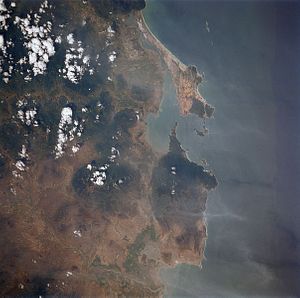Three Chinese warships with the People’s Liberation Army-Navy made a port call in Cam Ranh Bay in Vietnam on Saturday, where they will remain for a five-day visit intended to promote military-to-military ties between the two countries.
The ships belong the 23rd Chinese naval escort task force and include two Type 054A frigates, the PLAN Xiangtan and the PLAN Zhoushan, and one Type 903A replenishment ship, the PLAN Chaohu.
According to Senior Colonel Wang Hongli of the PLAN in Xinhua, China’s state news agency, the “visit to Vietnam is the last stop of the fleet on their way home after completing escort missions in the Gulf of Aden, the waters off Somali and visiting Myanmar, Malaysia and Cambodia.”
“This visit will enhance mutual understanding and promote friendship, thus contributing to bilateral relationship at the government and military levels,” Wang added.
Though the Chinese Navy has made regular visits to Vietnam, this particular port call marks the first since Vietnam opened an international port facility capable of accommodating visiting warships at Cam Ranh Bay earlier this year.
Since the inauguration of the international port at Cam Ranh, ships from various navies, including the U.S. and Japanese navies, have visited the strategically important Vietnam port, which sits on the South China Sea.
U.S. Arleigh Burke-class destroyers visited Cam Ranh Bay earlier this month, marking the first visit by U.S. warships to Vietnam since the end of the Vietnam War. The visit followed a decision by the United States to fully lift its arms embargo on Vietnam earlier this year.
In April 2016, two Japanese destroyers visited Cam Ranh Bay in a historic move that underlined Japan’s increased interest in expanding defense cooperation and ties with Southeast Asian states, including Vietnam.
Relations between China and Vietnam remain cordial, but strained by differences in the South China Sea, where the two dispute the sovereignty of features in the Paracel and Spratly Islands. Tensions between the two countries spiked in the summer of 2014, when China moved an oil rig into disputed waters, drawing sharp protest from Vietnam.
China seized the Paracel Islands from South Vietnam in 1974, in what came to be known as the Battle of the Paracel Islands. The countries fought a longer war in 1979, which resulted in a small loss of Vietnamese territory to China.































